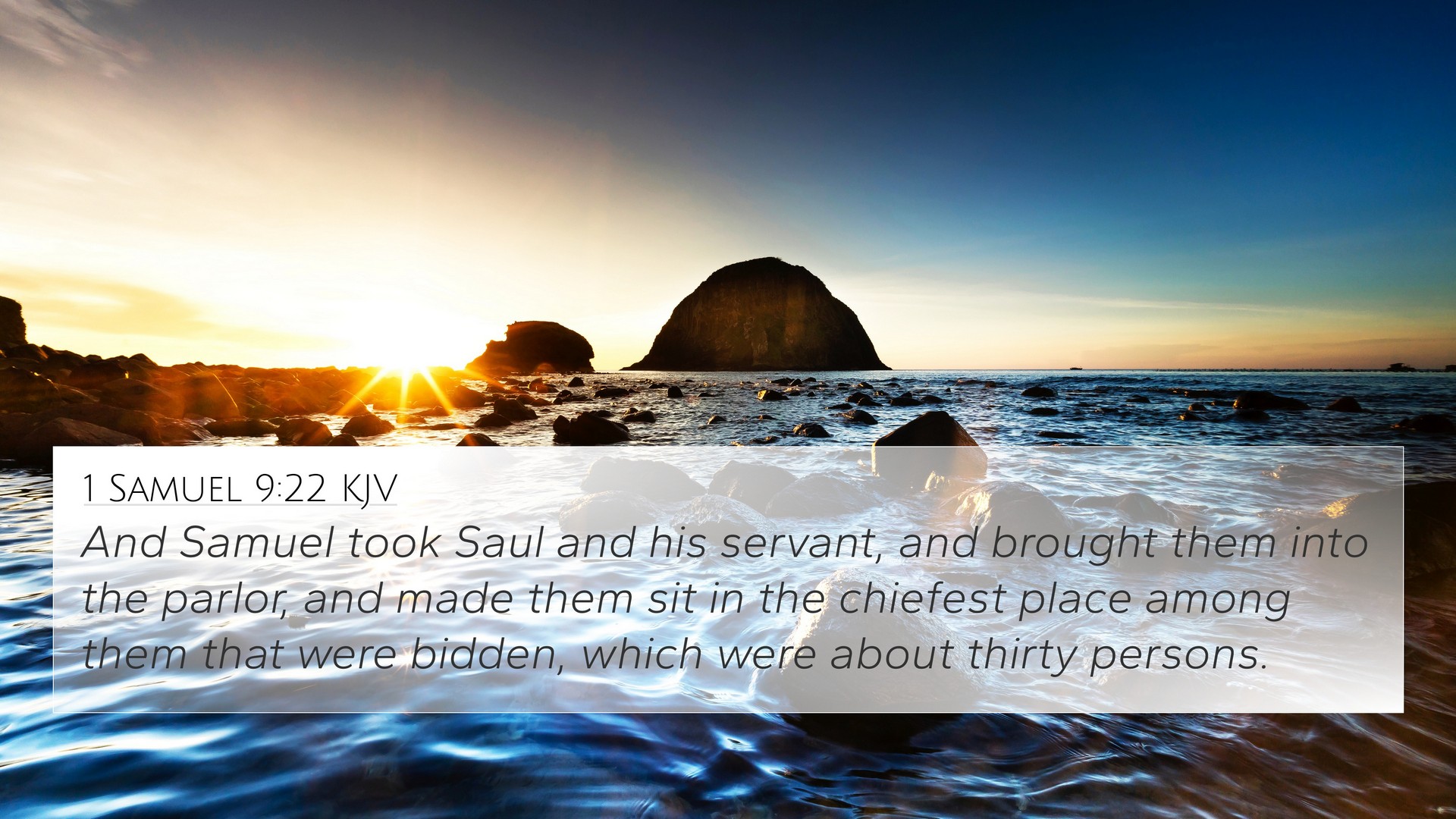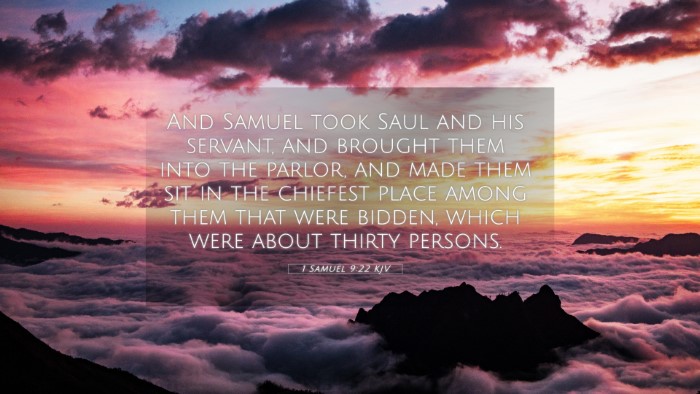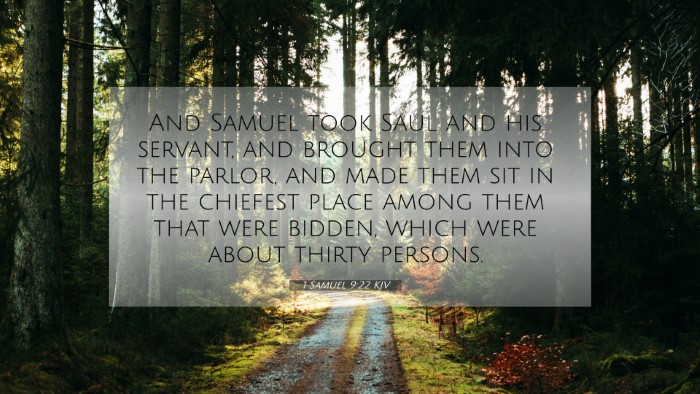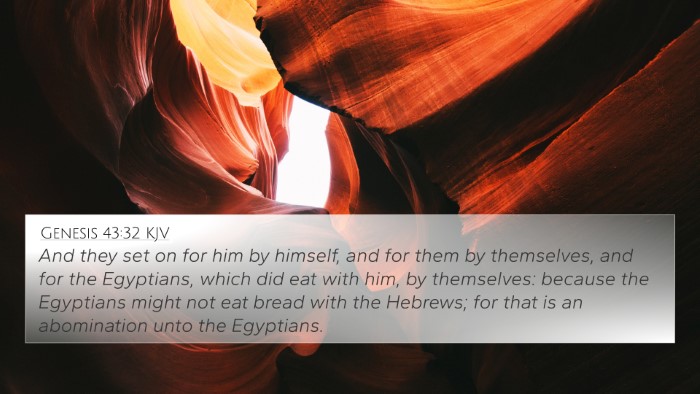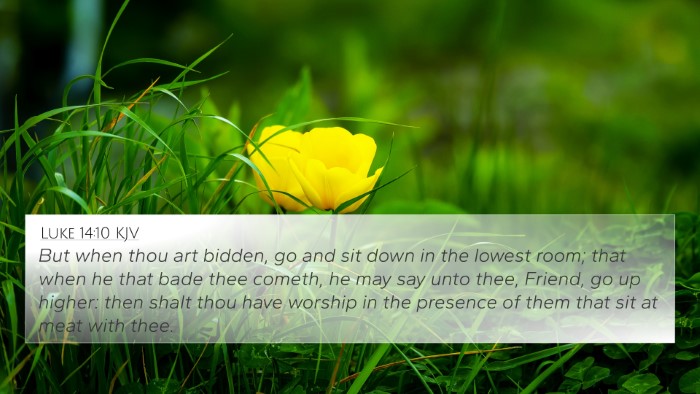Understanding 1 Samuel 9:22
Verse Reference: 1 Samuel 9:22 - "And Samuel took Saul and his servant, and brought them into the parlour, and made them sit in the chiefest place among them that were bidden, which were about thirty persons."
Summary and Interpretation
The verse highlights a significant moment in the biblical narrative where Samuel, the prophet, honors Saul and his servant. This act of bringing them to the chiefest place among a select group indicates a special recognition and sets the stage for Saul's future role as king. The context of inviting Saul demonstrates the divine orchestration of Saul's life and Samuel's role as God’s messenger.
Insights from Public Domain Commentaries
- Matthew Henry:
Henry emphasizes that Samuel's actions reflect divine providence, as Saul is unexpectedly chosen for leadership among God’s people. His seating at the highest place signifies the favor of God, not only in Samuel’s eyes but also among others present, foreshadowing the greater purpose God has for Saul.
- Albert Barnes:
Barnes notes that the gathering highlights the significance of Samuel's prophetic role and the communal acknowledgment of Saul's potential as leaders in Israel. He comments on the importance of public acknowledgment in leadership roles, especially in a theocratic society, linking it to the greater idea of anointed leaders guiding God’s people.
- Adam Clarke:
Clarke delves into the symbolism of the gathering and the meal, which constitutes community and covenant. He draws connections to hospitality customs of the time, explaining that inviting someone to sit in a place of honor implies a serious commitment to shared leadership and destiny.
Thematic Connections
This verse can be cross-referenced with several key themes and verses throughout the Bible, illustrating the interconnectedness of scriptural narratives.
Key Cross-References:
- 1 Samuel 16:1: God sends Samuel to anoint Saul as king, illustrating the beginning of divine choice.
- 1 Samuel 10:1: Samuel anoints Saul, emphasizing the importance of divine selection in leadership.
- Psalm 75:7: "But God is the judge: he putteth down one, and setteth up another," reflecting on God's sovereignty in elevating leaders.
- Proverbs 21:1: "The king's heart is in the hand of the Lord," highlighting divine influence over personal leadership decisions.
- Luke 22:27: Jesus discusses leadership, showing that earthly leadership differs from God's view of service and honor.
- Acts 13:22: Refers back to David as a 'man after God’s own heart,' establishing a lineage of chosen leadership from Saul onwards.
- Romans 13:1: "Let every soul be subject unto the higher powers," reflecting on the divine appointment of authorities as seen in Saul's rise.
Applications and Lessons
This verse teaches several principles relevant to understanding biblical leadership and God's work in individuals.
- Divine Appointment: It emphasizes that leaders are often chosen by God, underscoring the importance of recognizing God's hand in our lives.
- Public Recognition: Samuel's public acknowledgment of Saul reflects the community's role in affirming God's choices.
- Fulfillment of Purpose: Just as Saul was brought into a position of honor, individuals today should understand God's purpose for their lives, potentially leading to great responsibilities.
- Obedience to God's Will: Samuel’s obedience in anointing Saul is a reminder for contemporary believers to seek and obey God's direction.
- Leadership and Service: True leadership is about serving others, as later highlighted in the New Testament.
How to Use Cross-References for Deeper Understanding
Utilizing cross-references can help individuals better understand the connections and themes present across Scripture, adding depth to Bible study.
- Bible Concordance: A useful tool to find similar verses based on keywords, which can reveal thematic connections.
- Bible Cross-Reference Guide: Establishes links between verses that share context or theme, encouraging comparative analysis of scripture.
- Cross-Reference Bible Study: Engages students of the word to explore inter-Biblical dialogues and thematic developments.
- Bible Chain References: A method to link verses sequentially to enhance scriptural understanding holistically.
Conclusion
1 Samuel 9:22 serves as a landmark verse illustrating God's divine selection of leaders, the importance of community recognition, and the unfolding of God's purposes through chosen individuals. By employing cross-referencing techniques in your Bible study, one can gain not only a deeper understanding of this verse but also of the broader themes presented throughout the scriptures. Connecting this verse with both the Old and New Testament expands its implications and relevance for today's believers.
